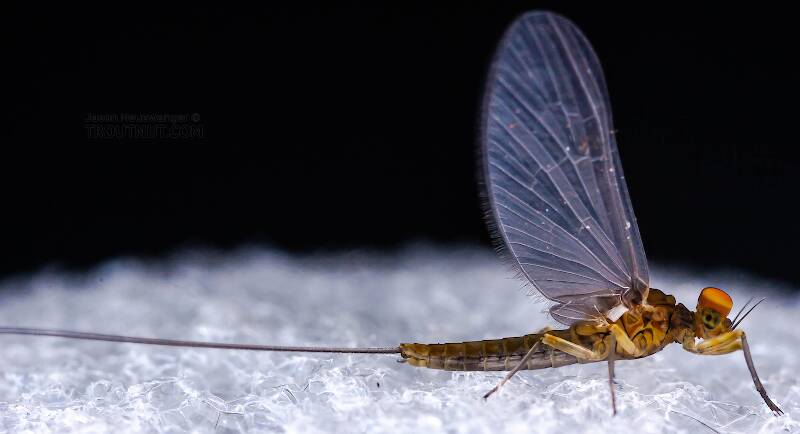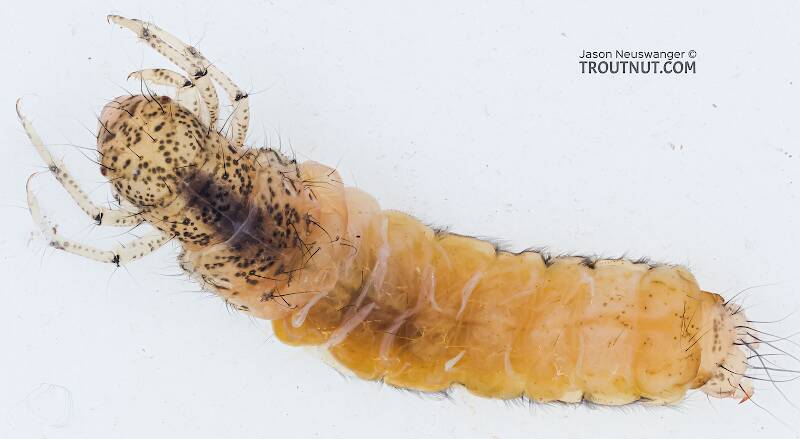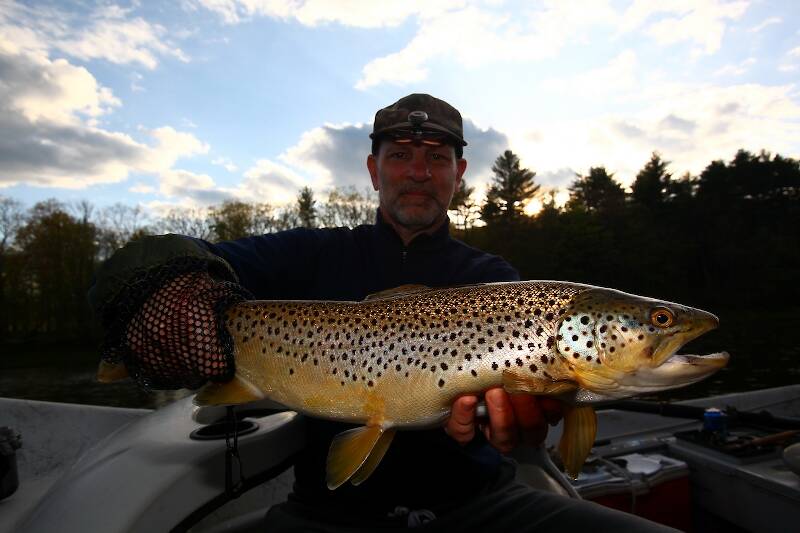
Blue-winged Olives
Baetis
Tiny Baetis mayflies are perhaps the most commonly encountered and imitated by anglers on all American trout streams due to their great abundance, widespread distribution, and trout-friendly emergence habits.
Featured on the forum

This is a striking caddis larva with an interesting color pattern on the head. Here are some characteristics I was able to see under the microscope, but could not easily expose for a picture:
- The prosternal horn is present.
- The mandible is clearly toothed, not formed into a uniform scraper blade.
- The seems to be only 2 major setae on the ventral edge of the hind femur.
- Chloride epithelia seem to be absent from the dorsal side of any abdominal segments.
Based on these characteristics and the ones more easily visible from the pictures, this seems to be Grammotaulius. The key's description of the case is spot-on: "Case cylindrical, made of longitudinally arranged sedge or similar leaves," as is the description of the markings on the head, "Dorsum of head light brownish yellow with numerous discrete, small, dark spots." The spot pattern on the head is a very good match to figure 19.312 of Merritt R.W., Cummins, K.W., and Berg, M.B. (2019). The species ID is based on Grammotaulius betteni being the only species of this genus known in Washington state.
- The prosternal horn is present.
- The mandible is clearly toothed, not formed into a uniform scraper blade.
- The seems to be only 2 major setae on the ventral edge of the hind femur.
- Chloride epithelia seem to be absent from the dorsal side of any abdominal segments.
Based on these characteristics and the ones more easily visible from the pictures, this seems to be Grammotaulius. The key's description of the case is spot-on: "Case cylindrical, made of longitudinally arranged sedge or similar leaves," as is the description of the markings on the head, "Dorsum of head light brownish yellow with numerous discrete, small, dark spots." The spot pattern on the head is a very good match to figure 19.312 of Merritt R.W., Cummins, K.W., and Berg, M.B. (2019). The species ID is based on Grammotaulius betteni being the only species of this genus known in Washington state.

Troutnut is a project started in 2003 by salmonid ecologist Jason "Troutnut" Neuswanger to help anglers and
fly tyers unabashedly embrace the entomological side of the sport. Learn more about Troutnut or
support the project for an enhanced experience here.
Troutnut on Nov 3, 2006November 3rd, 2006, 7:03 am EST
I wanted to reply to something interesting that Gonzo wrote in a fly tying thread, but I don't want to steer that productive discussion away from tying, so I'm posting it here.
He wrote:
I'm sure that's a common sentiment, but for me I think it's actually the opposite. Or at least I feel the opposite way about the kind of patience usually mentioned in the same breath as fishing; Gonzo may be talking about another kind.
When a lot of people talk about patience and fishing, they mean a willingness to sit around for hours waiting for something to happen -- laying on the dock half-asleep, pole in one hand and beer in the other. Or even trolling for hours.
I think Gonzo may be referring to another kind of patience, more akin to persistence, in which we try to learn or perfect something in a million little ways before we get it just right. We are patient in that we can wait indefinitely for the reward, but the fun of seeking it is what we're really after anyway. I love fly fishing for trout because it is such an involved and endless learning process. Every rise is a puzzle and every cast a piece. I stand there in waders arranging the pieces in my head, trying to see the big picture. There is never a dull moment. I may spend an hour trying to fool a single stubborn fish; some may call that patience, but to me it's exciting action and it satisfies my short attention span. (That really shows in my tying, too. I will happily spend several hours trying to get a new fly just right, but once I do I get bored after 30 minutes replicating it. Then I lose the three I tied to alders and have to figure it out all over again...)
So if Gonzo was talking about the second types of patience then I have no real disagreement, but I think it's good to point out the distinction between the two types. Sometimes outsiders get the impression that fly fishing is boring by hearing praise for the second kind of patience and confusing it with the first.
He wrote:
I've often thought that learning patience was one of the greatest virtues of fishing--perhaps the most underrated lesson of all.
I'm sure that's a common sentiment, but for me I think it's actually the opposite. Or at least I feel the opposite way about the kind of patience usually mentioned in the same breath as fishing; Gonzo may be talking about another kind.
When a lot of people talk about patience and fishing, they mean a willingness to sit around for hours waiting for something to happen -- laying on the dock half-asleep, pole in one hand and beer in the other. Or even trolling for hours.
I think Gonzo may be referring to another kind of patience, more akin to persistence, in which we try to learn or perfect something in a million little ways before we get it just right. We are patient in that we can wait indefinitely for the reward, but the fun of seeking it is what we're really after anyway. I love fly fishing for trout because it is such an involved and endless learning process. Every rise is a puzzle and every cast a piece. I stand there in waders arranging the pieces in my head, trying to see the big picture. There is never a dull moment. I may spend an hour trying to fool a single stubborn fish; some may call that patience, but to me it's exciting action and it satisfies my short attention span. (That really shows in my tying, too. I will happily spend several hours trying to get a new fly just right, but once I do I get bored after 30 minutes replicating it. Then I lose the three I tied to alders and have to figure it out all over again...)
So if Gonzo was talking about the second types of patience then I have no real disagreement, but I think it's good to point out the distinction between the two types. Sometimes outsiders get the impression that fly fishing is boring by hearing praise for the second kind of patience and confusing it with the first.
Jason Neuswanger, Ph.D.
Troutnut and salmonid ecologist
Troutnut and salmonid ecologist
GONZO on Nov 3, 2006November 3rd, 2006, 7:19 am EST
Jason,
A very good clarification, and one with which I heartily agree. If one conflates "patience" with inactivity or indolence, then my meaning is lost. If I can be forgiven the indiscretion of quoting my own words--"Patience is a virtue of fishing; laziness is not."
A very good clarification, and one with which I heartily agree. If one conflates "patience" with inactivity or indolence, then my meaning is lost. If I can be forgiven the indiscretion of quoting my own words--"Patience is a virtue of fishing; laziness is not."
Shawnny3 on Nov 3, 2006November 3rd, 2006, 10:37 am EST
Yes, Jason, there's clearly a difference. I know my father prefers the former type of fishing (sans beer, cigar in its stead), which is fine for him. Every time I go fishing with him, it becomes a competition in which I try my butt off to catch more fish on flies I've spent countless hours tying than he does on the dozen worms he's picked up at the bait shop on the way to the stream. Occasionally, when the conditions are terrible for worm-fishing, I actually win this little competition. But there has been many a time when, after catching his fourth or fifth fish in a row, my Dad will shift his cigar to the side of his mouth and say deliberately, "Shawnny, it's like I always say - real fish like real food." I still haven't come up with a good zinger when I'm catching more fish, but when he's outfishing me I'm never without a denigrating response like, "Dad, you might want to take off some of that weight - I'm pretty sure snagging is illegal here." Dads are always better at talking the smack, though: When I'm catching fish, he'll lean over in apparent interest and say, "What have you got on there, anyway?" Falling for it every time, I'll tell him what I've tied on the hook, after which he'll shake his head and say, "That's it? I'd be ashamed to catch a fish on that. Imagine giving him nothing more to eat than a mouthful of fur and feathers."
My Dad's my Dad, and I don't have any problem with his taking the lazy approach, but the reason I fish is for the puzzle Jason was referring to - to each his own. It is fun to make a little competition out of it, and sometimes it's good for the elitist in me to remember that a grubby old worm is sometimes (OK, usually) better than a perfectly tied fly.
Gonzo, what you quoted was well said, so why not? And how are we to be sure anyone will ever quote us if we don't do it for ourselves now and then?
-Shawn
My Dad's my Dad, and I don't have any problem with his taking the lazy approach, but the reason I fish is for the puzzle Jason was referring to - to each his own. It is fun to make a little competition out of it, and sometimes it's good for the elitist in me to remember that a grubby old worm is sometimes (OK, usually) better than a perfectly tied fly.
Gonzo, what you quoted was well said, so why not? And how are we to be sure anyone will ever quote us if we don't do it for ourselves now and then?
-Shawn
Jewelry-Quality Artistic Salmon Flies, by Shawn Davis
www.davisflydesigns.com
www.davisflydesigns.com
GONZO on Nov 3, 2006November 3rd, 2006, 12:18 pm EST
Thanks Shawn,
Your dad sounds like a great guy, even if he does fish with "garden hackle." I learned a long time ago that playing a game of one-upmanship with one's dad was a losing proposition--after all, you have the same basic tools to use, and he has a few decades more practice. (Though PETA might have some information on cruelty to worms that you could play to your advantage.) And you're right, of course; without self-importance, sometimes we're left with no importance at all! :)
And Jason,
I find it hard to believe that you have a "short attention span." Remember, I've read your paper on "Selective Drift Feeding." While the mathematical equations are totally beyond my grasp, I can't believe it is the product of an attention span that is anything short of prodigious.
Getting bored by mindless repetitive activity is less about attention than interest. I, too, get numbed by repetitive fly tying (the very reason I've never considered tying commercially), but sometimes it is necessary. I think the quality called for in that instance is not patience but discipline. I have the former quality in spades, but the latter still needs some work!
Your dad sounds like a great guy, even if he does fish with "garden hackle." I learned a long time ago that playing a game of one-upmanship with one's dad was a losing proposition--after all, you have the same basic tools to use, and he has a few decades more practice. (Though PETA might have some information on cruelty to worms that you could play to your advantage.) And you're right, of course; without self-importance, sometimes we're left with no importance at all! :)
And Jason,
I find it hard to believe that you have a "short attention span." Remember, I've read your paper on "Selective Drift Feeding." While the mathematical equations are totally beyond my grasp, I can't believe it is the product of an attention span that is anything short of prodigious.
Getting bored by mindless repetitive activity is less about attention than interest. I, too, get numbed by repetitive fly tying (the very reason I've never considered tying commercially), but sometimes it is necessary. I think the quality called for in that instance is not patience but discipline. I have the former quality in spades, but the latter still needs some work!
Softhackle on Nov 4, 2006November 4th, 2006, 1:30 am EST
Jason,
I believe you have given us the exact definition of patience. The other definition, the first you gave, is often one used for indifference or lack of care, or as Gonzo said, laziness. Patience is endurance and perseverance despite the stress we're under. For example: continuing to try tying a new pattern we've never tied before till we perfect it; trying for a difficult to catch fish; showing someone new to the game how to cast or tie flies. This carries over into our everyday life as well.
Thanks for bringing it to our attention.
Mark
I believe you have given us the exact definition of patience. The other definition, the first you gave, is often one used for indifference or lack of care, or as Gonzo said, laziness. Patience is endurance and perseverance despite the stress we're under. For example: continuing to try tying a new pattern we've never tied before till we perfect it; trying for a difficult to catch fish; showing someone new to the game how to cast or tie flies. This carries over into our everyday life as well.
Thanks for bringing it to our attention.
Mark
"I have the highest respect for the skilled wet-fly fisherman, as he has mastered an art of very great difficulty." Edward R. Hewitt
Flymphs, Soft-hackles and Spiders: http://www.troutnut.com/libstudio/FS&S/index.html
Flymphs, Soft-hackles and Spiders: http://www.troutnut.com/libstudio/FS&S/index.html
Martinlf on Nov 4, 2006November 4th, 2006, 10:02 am EST
Shawnny3's post made me think of a favorite novel, The River Why, that describes family debates over fly fishing and worm dunking, among many, many, other topics related to fly fishing. It's a great read, and the following website will give a bit of information on it:
http://www.ucpress.edu/books/sc/pages/SC50847.html
Thanks for the observations on patience as well. They made me recall a day on Codorus Creek when caddis were hatching. After trying every dry caddis in my box, I gave up to gnaw on some jerky and contemplate going home. Sitting by the stream and digging through the empty spaces in my mind, I stumbled over a memory of an article about fishing soft hackles for emerging caddis. Somehow I rigged up a small unribbed hare's ear beadhead (Sorry Gonzo) with no tail (the folks at Flyfisher's Paradise call this a Walt's Worm) on point and tied a Partridge and Orange that I'd had for years but never used before, as a dropper. The wild browns in that stream were all over the combo, sometimes taking the point, sometimes the dropper. I ended up in a riffle at dusk, catching far more and bigger fish than I had dreamed could ever be found in that stretch of this small stream. This experience taught me a lot about the kind of patience Jason mentions, the will to keep trying and believing that you can solve the puzzle, and it certainly made me a true believer in soft hackles--though I've never experienced the same intensity using them since. It also internalized the fact, which I'd probably read about several times, that fish will move and concentrate to feed in a riffle. I know it sounds dumb, but I just hadn't fully appreciated this before. The poet Keats said that knowledge is often missed until we "prove it upon our pulses." Well, my pulse provided plenty of proof that evening.
http://www.ucpress.edu/books/sc/pages/SC50847.html
Thanks for the observations on patience as well. They made me recall a day on Codorus Creek when caddis were hatching. After trying every dry caddis in my box, I gave up to gnaw on some jerky and contemplate going home. Sitting by the stream and digging through the empty spaces in my mind, I stumbled over a memory of an article about fishing soft hackles for emerging caddis. Somehow I rigged up a small unribbed hare's ear beadhead (Sorry Gonzo) with no tail (the folks at Flyfisher's Paradise call this a Walt's Worm) on point and tied a Partridge and Orange that I'd had for years but never used before, as a dropper. The wild browns in that stream were all over the combo, sometimes taking the point, sometimes the dropper. I ended up in a riffle at dusk, catching far more and bigger fish than I had dreamed could ever be found in that stretch of this small stream. This experience taught me a lot about the kind of patience Jason mentions, the will to keep trying and believing that you can solve the puzzle, and it certainly made me a true believer in soft hackles--though I've never experienced the same intensity using them since. It also internalized the fact, which I'd probably read about several times, that fish will move and concentrate to feed in a riffle. I know it sounds dumb, but I just hadn't fully appreciated this before. The poet Keats said that knowledge is often missed until we "prove it upon our pulses." Well, my pulse provided plenty of proof that evening.
"He spread them a yard and a half. 'And every one that got away is this big.'"
--Fred Chappell
--Fred Chappell
Shawnny3 on Nov 5, 2006November 5th, 2006, 5:19 am EST
Thanks, Lewis, for that.
I don't much like reading, but a non-fishing friend gave me a copy of "The River Why" a few years ago, and I read it cover to cover in about a week, an incredible feat for me. It's probably the best book on fishing I've ever read, bar none - hilarious and philosophical at the same time. Really good stuff.
I recall a similar day on Spring Creek when there were fish rising everywhere to some small, early-spring mayfly, and I was fishing one of the most heavily fished runs on that stream (which is to say, in the world...). I beat that amazing water to death for an hour with nymphs, figuring (rightly) that dries would have been an utter waste of my time - unfortunately, however, so were the nymphs. Finally, still skunked about 5 minutes before I had to leave, I tossed my rig up into the 3-inch-deep trickling riffle way over on the edge of the stream, way out of the main current, and practically before it hit the water it was hammered by a 15-inch brown. Next cast - 14-inch rainbow. Next cast - 14-inch brown. Next cast - 15-inch rainbow. At that point I realized simultaneously what a fool I'd been and what a fool I'd be for staying another minute, because my wife was waiting for me to go to church with her. It was hard to pay attention during that sermon, but I did learn a lesson about fishing that day...
-Shawn
I don't much like reading, but a non-fishing friend gave me a copy of "The River Why" a few years ago, and I read it cover to cover in about a week, an incredible feat for me. It's probably the best book on fishing I've ever read, bar none - hilarious and philosophical at the same time. Really good stuff.
I recall a similar day on Spring Creek when there were fish rising everywhere to some small, early-spring mayfly, and I was fishing one of the most heavily fished runs on that stream (which is to say, in the world...). I beat that amazing water to death for an hour with nymphs, figuring (rightly) that dries would have been an utter waste of my time - unfortunately, however, so were the nymphs. Finally, still skunked about 5 minutes before I had to leave, I tossed my rig up into the 3-inch-deep trickling riffle way over on the edge of the stream, way out of the main current, and practically before it hit the water it was hammered by a 15-inch brown. Next cast - 14-inch rainbow. Next cast - 14-inch brown. Next cast - 15-inch rainbow. At that point I realized simultaneously what a fool I'd been and what a fool I'd be for staying another minute, because my wife was waiting for me to go to church with her. It was hard to pay attention during that sermon, but I did learn a lesson about fishing that day...
-Shawn
Jewelry-Quality Artistic Salmon Flies, by Shawn Davis
www.davisflydesigns.com
www.davisflydesigns.com
Martinlf on Nov 6, 2006November 6th, 2006, 4:19 am EST
Great story, Shawn. So they were feeding in the thin riffle off to the side. What fly did you throw on them, a dry or nymph?
Oh yes, we all know too well that when one is on the clock and the wife is waiting the fishing will pick up just before it's time to leave. Ain't it the pitts?
Oh yes, we all know too well that when one is on the clock and the wife is waiting the fishing will pick up just before it's time to leave. Ain't it the pitts?
"He spread them a yard and a half. 'And every one that got away is this big.'"
--Fred Chappell
--Fred Chappell
Quick Reply
Related Discussions
Topic
Replies
Last Reply
15
Jun 29, 2015
by Corey
by Corey




